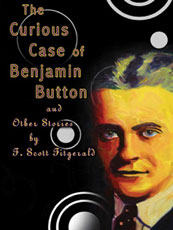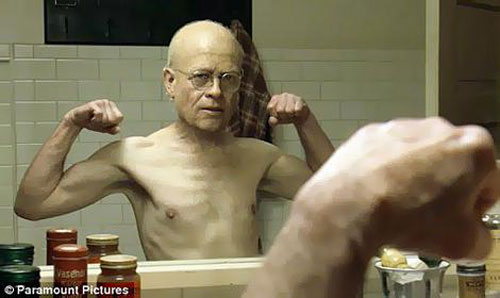|
From time to time directors make films that attempt to present a panoramic vision of the world. Usually they do this through the eyes of one character, an innocent a' la Voltaire's Candide; Robert Zemeckis' Forrest Gump is probably the most famous example.
The end of 2008 brought two new entries in this genre—Danny Boyle and Loveleen Tandan's Slumdog Millionaire and David Fincher's The Curious Case of Benjamin Button. Though the two films are far apart in style and theme, both exhibit the urgency of a director's effort to create an important, all-encompassing vision of life and humanity.
Slumdog Millionaire is the better of the two, indeed a contender for classic status, although I found myself disagreeing with the preponderance of reviewers who have described the film as an unbridled explosion of joy. The ending is as happy as anyone could wish, but the Bollywood artificiality of that ending compared with the gritty reality of the rest of the film made me wonder how literally Boyle and Tandan intended us to take it. It's as if Boyle had ended Trainspotting with a dance number from Seven Brides for Seven Brothers.
Rest assured that Slumdog Millionaire exceeds even Trainspotting in its portrayal of human depravity and societal decay. The film begins with the hero, Jamal (Dev Patel), being beaten and tortured by the police. Jamal has just won ten million rupees in the Indian version of Who Wants to Be a Millionaire?, and is on track to win the grand prize of twenty million rupees. But the show's smarmy host (Anil Kapoor) and the police inspector he calls in (Irrfan Khan) are certain Jamal is cheating. Jamal is an uneducated teenage slum kid, a "chai wallah" (gopher) at one of India's innumerable tech support companies; he's so ignorant that he doesn't even know Gandhi's picture is on the ten-rupee note. So how does he know that Benjamin Franklin is on the American hundred-dollar bill?
Eventually, Jamal confesses—not to cheating, but to having a hard-knock life that, at crucial moments, provided him the exact information or intuition he needed to answer the questions on the show. It is from this premise that screenwriter Simon Beaufoy, adapting Vikas Swarup's novel Q&A, creates a brilliant, no-holds-barred portrait of modern India—which is to say, of the modern world. All the extremes of life, society and human nature are in this film.
Boyle, Tandan and Beaufoy give the audience a strong dose of the unimaginable poverty and cruelty suffered by Jamal, his cynical brother Salim, and Latika, the girl Jamal loves. I won't go into detail here, to preserve the film's impact, but Jamal faces personally every problem that India faces as a society. In many places the film reaches a Dickensian intensity, complete with characters that bear a direct correlation to Fagin, Bill Sikes and Mr. Bumble. Probably no film since Mira Nair's Salaam Bombay! has so movingly presented the plight of India's street children.

What makes the multiple tragedies bearable is the film's ironic, bawdy sense of humor. One funny sequence is that of Jamal and Salim's adventures at the Taj Mahal, eking out a living by stealing tourists' shoes and leading them on highly fanciful guided tours. Another is Jamal, sitting in for one of the techies at his company, trying to deal with an angry Scotswoman on the line. There also is a gross-out scene to end all gross-out scenes. (I won't describe it here, but try to imagine the "Worst Toilet in Scotland" sequence in Trainspotting multiplied by the now-infamous gross-out scene in Kevin Smith's Zack and Miri Make a Porno.)
Slumdog Millionaire is an engrossing cinematic experience, enveloping us completely in its funny and frightening world. The cinematography of Anthony Dod Mantle, the editing of Chris Dickens, the production design of Mark Digby and the music of A.R. Rahman marinate us in the sights and sounds of India. The acting could not be improved in any way, and Patel's Jamal is a thoroughly lovable teen Everyman, a Lloyd Dobler for the Indian subcontinent. Yet "joyous" is not a word I would use to describe the film. Its happy ending is purchased at the price of a desperate sacrifice by one of its major characters, and—without giving away any plot points—not all of Jamal's potential enemies are completely neutralized at the end. Add to that a simple fact: at current exchange rates, twenty million rupees are worth slightly more than four hundred thousand dollars—not a sum that will last very long, even in today's depressed economy. In any case, there has never been an ending in the history of the cinema happy enough to erase the memory of the police attaching electrodes to the hero's bare feet. .
I have no idea how closely Boyle, Tandan and Beaufoy follow Vikas Swarup's novel. But The Curious Case of Benjamin Button is an edifying example of what happens when directors and screenwriters think they know better than the original authors. Although the credits say the film is based on the short story by F. Scott Fitzgerald, director David Fincher and screenwriter Eric Roth (working from a story by himself and Robin Swicord) retain nothing of Fitzgerald's work except the title and the basic premise: a man is literally born old and progresses backward through life, ending as a baby. Even the film's opening parable—of a clockmaker during World War I who constructs a rail-station clock that runs backward, in the hope that he can turn back time and regain a son killed in the war—owes nothing to Fitzgerald.
I thought I had read all of Fitzgerald's major stories, but I never read "The Curious Case of Benjamin Button" until after I saw Fincher's movie.  Set in Baltimore between 1860 and 1930, Fitzgerald's story is a tart, ruefully funny social satire. As Benjamin grows ever younger in his wealthy, unimaginative WASP milieu, he helplessly incurs the wrath of first his father, then his wife, and finally his son, who cannot deal with a family member who will not conform to society's expectations. "If you've made up your mind to be different from everybody else, I don't suppose I can stop you, but I really don't think it's very considerate," Benjamin's wife Hildegarde tells him at one point. When Benjamin replies that he can't help it, Hildegarde says, "You can too. You're simply stubborn." If we could have a nickel for every time a similar conversation has taken place in a comfortable family parlor with a non-conforming family member, we'd all be as rich as the Buttons. Set in Baltimore between 1860 and 1930, Fitzgerald's story is a tart, ruefully funny social satire. As Benjamin grows ever younger in his wealthy, unimaginative WASP milieu, he helplessly incurs the wrath of first his father, then his wife, and finally his son, who cannot deal with a family member who will not conform to society's expectations. "If you've made up your mind to be different from everybody else, I don't suppose I can stop you, but I really don't think it's very considerate," Benjamin's wife Hildegarde tells him at one point. When Benjamin replies that he can't help it, Hildegarde says, "You can too. You're simply stubborn." If we could have a nickel for every time a similar conversation has taken place in a comfortable family parlor with a non-conforming family member, we'd all be as rich as the Buttons.
Fitzgerald's elegant, sardonic story, though undeniably "high-concept" in Hollywood terms, is defiantly unsuitable as the subject of a feature-length film. Fincher and Roth get around that difficulty by jettisoning everything but the high concept and creating their own story. The slant their story takes can be ascertained easily, once you know that Roth won an Oscar for writing the screenplay of Forrest Gump.
The archetype of the Holy Fool is potent in world mythology, and Forrest Gump was a natural winner, taking a man of limited intelligence but infinite soul through a whirlwind tour of the major upheavals of American history from the 1950s to the 1990s. Fincher and Roth apply the same treatment to the character of Benjamin Button; the problem is that Benjamin is not a holy fool, but an average guy afflicted by a chronological anomaly. They try mightily to give Benjamin's story weight and importance, beginning his story on Armistice Day, 1918 and ending it on the day in 2005 that Hurricane Katrina made landfall in New Orleans, which is where they move the story. They make Benjamin's father (Jason Flemyng) literally a button manufacturer (in Fitzgerald's original, he was a wholesale hardware merchant), and strive to make buttons a powerful motif in the story, holding clothes and society together. They, their special effects wizards and their makeup artists work wonders, believably having star Brad Pitt regress from his eighties to his late teens and credibly attaching his head to a series of wizened toddler and little-boy bodies. (They also do excellent work with co-star Cate Blanchett, though in the more normal way of progressive aging.)

Yet the story Fincher and Roth create, spanning decades and continents, never really adds up to much, despite some engaging set pieces. (There's a particularly graceful little fable toward the middle of the film on the tiny but momentous workings of fate, involving Blanchett and set in Paris.) It's an easygoing but vastly overlong (165 minutes) picaresque tale, lingering too long at its beginning in which old man-little boy Benjamin grows up in an old folks' home with his kindly, no-nonsense foster mother (Taraji P. Henson). Benjamin's singular life may take him all around the globe, but whereas Forrest Gump's adventures always had him front-and-center in the great events of his time, Benjamin's experiences are always on the periphery, adding a "So What?" factor to the film.
All of the film's acting is first-rate. Pitt—who worked with Fincher before in Se7en and Fight Club—gives a delicately calibrated, intensely sympathetic performance, and Blanchett is fully his equal. Yet the main feeling I had about The Curious Case of Benjamin Button was that it squandered its opportunities, relying too much on cinematic craft for its impact. That feeling was especially strong toward the end, when Benjamin is a middle-aged man in a young man's body. The concept of youth being wasted on the young, and the advantages we'd have if we only knew at twenty what we do at fifty, is as potent as that of the Holy Fool. Yet Fincher and Roth do nothing with that concept. Fitzgerald got around it, wittily, by making the point that Benjamin, like the other members of his social class, was protected by wealth, privilege and societal convention from ever having to think about anything. The one true advantage Benjamin gains is, entering Harvard as a fifty-year-old in a twenty-year-old's body, he joins the football team and scores seven touchdowns and fourteen field goals in his first game, becoming the campus hero overnight. Fincher and Roth, however, just let the idea lie, turning their story into a fairly standard tale of lost love and romantic renunciation.
So while The Curious Case of Benjamin Button offers certain pleasures to moviegoers, Slumdog Millionaire is the film that truly offers them a persuasive, panoramic tour of a cinematic world.
Meanwhile, if you're looking for a story that has stood the test of time, rent Forrest Gump.
Or, better yet, read F. Scott Fitzgerald. Or Voltaire's Candide.
|


